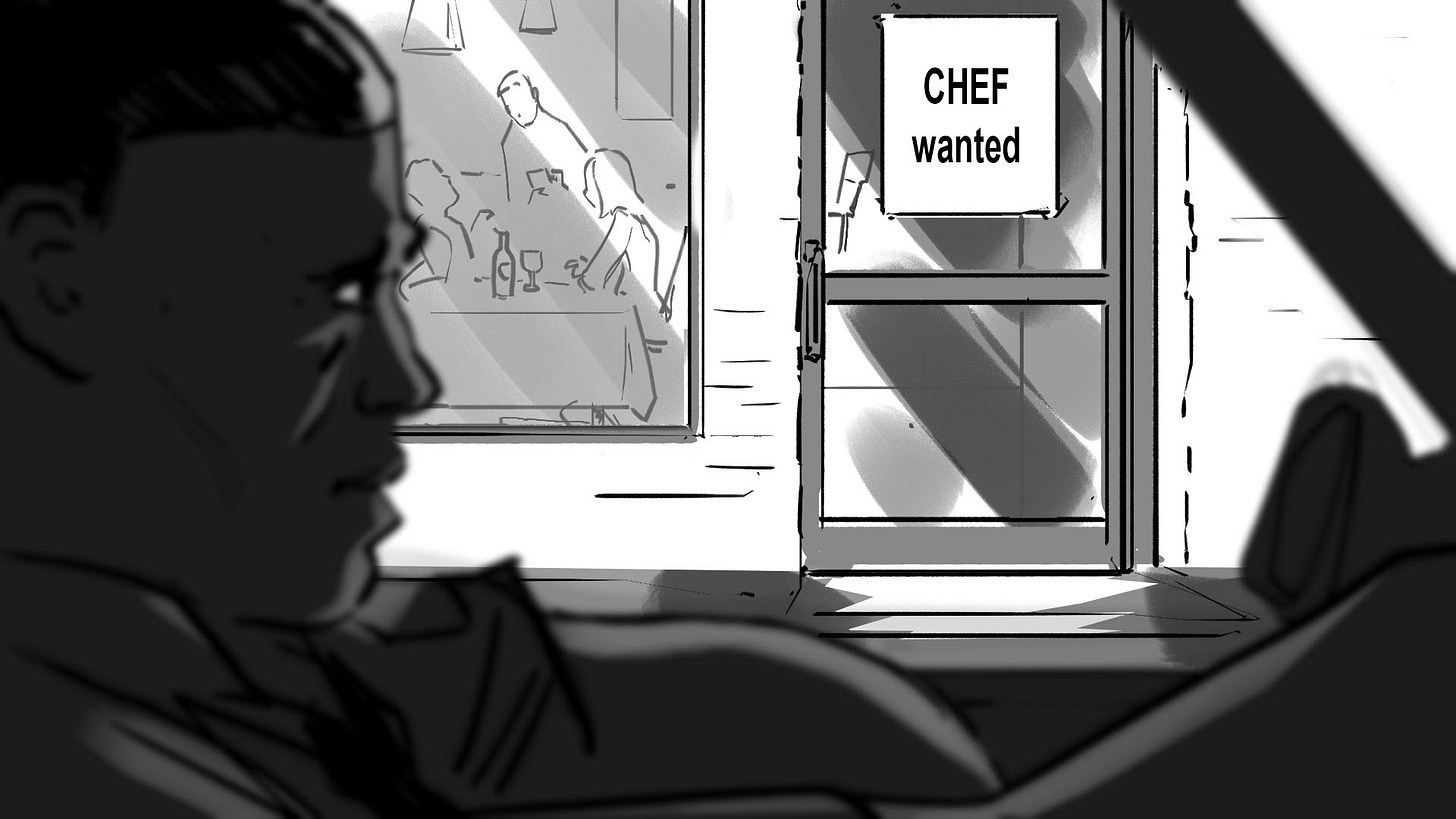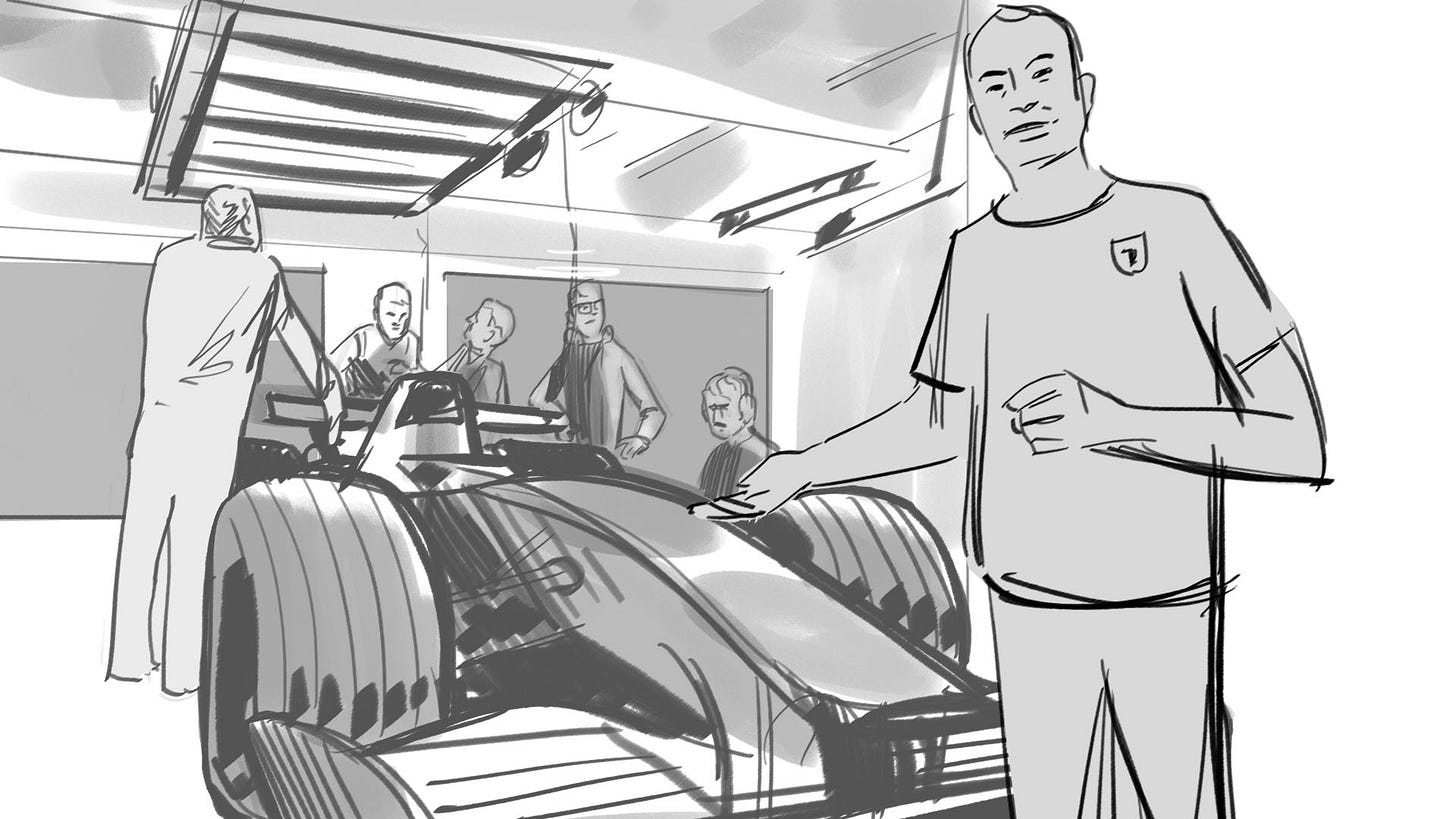Long Story Short ★ ADAM WATSON
How an early influence set him on his Storytelling journey.
Hailing from the Pacific Northwest, storyboard artist, animator and maker, Adam Watson was kind enough to have a chat with us about his life and career.
BTP: Tell us a little bit about yourself and why you decided to pursue your career as a creative storyteller
WATSON: I'm a storyboard artist, husband and dad of three, working in animation and live action commercials. I'm currently the Animation Coordinator for Niche Academy, an e-learning company, and run my freelance storyboarding business, The Mighty Adam, from home. I've always loved storytelling in some form or another. As kids we made movies with the video camera and put together our own comic books. In college I thought I might make a career out of acting, and then (when that didn't work) out of set design. Storyboarding, especially in hindsight, feels like a career that combines all those storytelling tools (and more.)
BTP: Where did you grow up and how was it, if at all, a catalyst for creative pursuits?
WATSON: I grew up in Issaquah, Washington with three siblings, an always-there cousin, a bunch of animals and a creek. This was the pre-internet, (the 80's!) so there was lots of time to go outside and be bored together. That was absolutely a catalyst. Outside there's so much room for your imagination to make stories. It's soooo important to be bored sometimes. (I tell my kids this all the time. Hopefully they'll get it one day)
BTP: Who was your first advocate or earliest mentor that helped in your pursuits?
WATSON: The very earliest would be my grandma. She taught oil painting classes and encouraged us kids to draw. She introduced me to charcoal and newsprint. I still have a huge stack of 1970's Walter Foster drawing books from her.
BTP: The WALTER FOSTER books were super-helpful for people just starting out. I still have a few. What creatives influence you these days and in what way?
WATSON: Lately I've been consuming and dissecting comics by the late, great Alex Toth. Every few years I revisit his work, and I see new things I never saw before. Simplifications and choices. Genius stuff. Drawing is problem-solving, and I know that if I'm stuck on a problem, he's already solved it somewhere. I'm also inspired by the people doing the kind of work I want to do. My former instructor Lanny Markasky, Dan Milligan, Bridget Shaw, Bill Thompson, and I'm learning a ton from Tony Liberatore right now. In animation, Kaitrin Snodgrass, Suzanne Moulton, Max Winston. I could give a list a mile long, but it'd be easier just to scroll through my Instagram follows! They all have the same sort of influence: they make me want to draw, to make stuff, and to get better at my art.
BTP: When you originally set out to study and learn, when did your learning take place and what resources did you have available to you?
WATSON: At the earliest, I was self-taught. I learned from books (storyboarding books were hard to find), from studying DVD extras and, when the internet was young, I learned a lot from studying artists on message boards. Before storyboarding became a career, I worked at an IT desk, and spent tons of down-time filling up sketchbooks. Now, there's no shortage of learning resources, classes, discord servers, YouTube...
BTP: Did you find it difficult to transition into a storyboarding career? How did you get your first job?
WATSON: Before I got really serious about it, it was difficult. But I was working in a vacuum. Once I started sharing my work, and connecting with classmates, it got much easier. My first job came through a friend of mine whom I knew from a cartoonist meetup group. He was at Amazon, making commercials, and sent me a text. "You ever done storyboards?" It was an Alexa commercial, with an awesome producer. Once that job finished, work started to come a little easier.
BTP: When compared to your early work experience do you feel like you were well-educated to step into a role or was there a larger divide between school and actual pipeline production?
WATSON: By the time I found online resources like CGMA, RadHowToSchool (now ProjectCity), I felt prepared to hit the pavement and take on freelance work. But there was absolutely a time when I said "yes" to work that was way outside my skill set.
BTP: Freelance is a very specific choice that not a lot of people thrive at. How did you arrive at that choice and how did you maintain getting regular work?
WATSON: It's tough! I had a long, full-time job at Amazon (a result of that first commercial!) but when that ended, I felt like I had enough momentum and experience to freelance. It's a long, slow process to roll a tiny snowball into something bigger and bigger. You meet people one day, and then you might be surprised to hear from them again 3,4,5 years later looking for an artist. Putting aside just a little time every week to connect with people, refresh old email chains, and talk with former classmates keeps my workload (mostly) healthy.
BTP: As creatives we tend to have personal goals or aspirations for ourselves. What are yours and what does achieving them look like in the next 5 to 10 years?
WATSON: In the next couple of years I'd love to move into TV and film storyboards. I really enjoy doing commercials and animated videos; a quick turnaround, never the same thing twice! But like a lot of people, movies lit that creative spark for me. I've set a 10 year goal of joining the Art Director's Guild. If I can hit that in 5, great! Also on my 5-year list are a few animated shorts, just for fun, which have been rattling around in my brain for a while.
BTP: Those are fantastic goals! How do you plan to go about making that transition to longer form storyboard work? Through connections? Referrals? Cold calls?
WATSON: That's an excellent question. And honestly, I'm still learning the ins and outs of that. But personal connections are the most important part, to me. I'm taking classes to fill the gaps in my knowledge; commercials are quite different from movies. And the best part of every class is the community of fellow students, many of whom have become great friends, and that professional connection with the instructor.
BTP: What are your biggest fears in your career currently and what are you doing to keep those in check?
WATSON: AI is definitely a scary new thing for us creatives. I'm worried that commercial storyboard gigs will be hit pretty hard by it, at least for a little while. But I remind myself that good directors/companies will always want art, (and stories!) to be human.
BTP: AI is definitely a concern for many creatives. I think you have the right attitude about it. Do you currently use AI in any of your pipeline to speed up production? Would you be opposed to it if it meant keeping the bills paid?
WATSON: I've played with AI, but never long enough to feel like it cooperates with me. I know some artists use it as a scenario-generator, if ideas aren't coming easily. I usually end up scrapping all the results and coming up with my own thing anyway. (Maybe that says more about me than about AI). I'd feel pretty rotten if I ended up using someone else's scraped work in order to get paid. Honestly, I don't think that's the most realistic application in my line of work, though. More likely AI would come into the pipeline from someone else, a producer maybe, who generates something for a kickoff meeting. "Can you give us 30 frames to sell soap, and make them look like this?" Mood boards, vision boards, that sort of thing.
BTP: Describe the perfect day for yourself. Comparatively, what would be the perfect workday?
WATSON: A perfect day is a Saturday after turning in a project. Cartoons in the morning, my daughter and I draw stuff together on a huge sheet of paper or make something on the workbench, we all go out for dinner, and finish the day with a movie.
On a perfect workday, I wake up to an availability email, or an introduction to a director/producer I haven't met. Get my daughter to school, my wife and I get coffee on the way back home, and then I knock out 20-30 frames of whatever I'm working on. I clock off at 5:00 on the dot, and I've set up my workspace to hit the ground running the next morning.
BTP: Amazing...I think our strengths come from our connections with those around us. Reminds us why we do what we do. Given the technological challenges in the creative fields ahead, would you steer your daughter toward or away from a creative career?
WATSON: All my kids, the young adults and my daughter, are still figuring out what they want to do. By the time they find careers, I'm sure they'll be much smarter than I am, especially about technology. I'd love to see my daughter in an art career, but maybe she'll end up a basketball player? And maybe that's creative too, if you're putting things out into the world. I'd like to let her steer, and hopefully those technological changes make things more and more accessible.
BTP: What advice would you give to your younger self regarding your life’s path thus far?
WATSON: Find a community of people at your level and STAY IN TOUCH. 90% of work will come from your peers.
Also, make something every day. Doesn't matter what, but don't let a day go by without making/drawing/writing/cooking/creating something.
BTP: 100%...all this, all day. Thanks so much for joining us. We really appreciate it.
WATSON: I really appreciate your thoughtful questions! Thanks so much!
BTP: Where can people find more of your work and get in touch with you?
WATSON: You can see my work at themightyadam.com and find me on Instagram as @themightyadam
I'd love to connect on LinkedIn, too: linkedin.com/in/adamwatsonseattle
I'm always happy to answer emails at themightyadam@gmail.com Got questions about storyboards? Send them my way!








